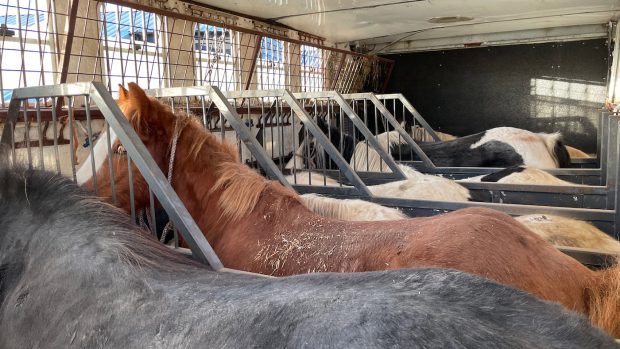Hopes for better conditions for slaughter were dashed last week when the European Union’s council of ministers failed to agree improvements to welfare conditions for farm animals in transport at a meeting in Luxembourg.
Although the European Parliament voted early last month for amendments to EU draft regulations on the Protection of Animals during Transport, the Council of Agricultural Ministers, who ultimately make the decision, were expected to be at loggerheads over the amendments, and discussions never got beyond the question of restricted journey times.
There is a fundamental conflict of commercial interest between more outlying countries such as Ireland, Italy and Spain, who export and import live animals for slaughter, and those such as Britain, Sweden and Denmark, who rank among those countries most concerned about animal welfare.
From a financial point of view, the former are opposed to shortened journey times because of the costly implications, and several countries, including Ireland, which holds the EU presidency, stressed that tighter restrictions on journey times would indeed harm their meat industry.
In a statement, the RSPCA was very clear about who stood to benefit and who stood to lose from the failure to resolve the issue:
“The welfare lobby was unable to persuade countries such as France, Spain and Italy who seemed determined to ignore animal suffering which can result from long distance live transport.
“Sadly, the 10 million animals transported across Europe every week will be the losers in all this as without significant amendment to the current law suffering will continue.”
The deadlock leaves a question mark over how Britain’s outdated minimum values rules, which at present have the de facto effect of preventing horses and ponies travelling abroad for slaughter, will be replaced or updated.
A DEFRA spokesman says: “We are back to sitting down and talking to the industry and the welfare groups, and we will see what we can do next. The priority remains that we won’t replace minimum values until we have something better.”
However, because the issue was not resolved last week, it has been set aside until the end of this presidency. A spokesman for the International League for the Protection of Horses (ILPH) believes however that the question may not be raised again until July 2005, when the UK takes over the EU presidency:
“We are extremely disappointed by last week’s deadlock, and there is concern that welfare issues could worsen with the enlargement of the EU, and the loss of border controls.
“The UK takes over the presidency next year, which is good news as the issue can at least be put before the Council again, if it hasn’t already been,” she continued.
“In the meantime, we are looking to see whether there is an opportunity for unilateral action by the UK to bring in an opt-out for the UK.”
DEFRA animal welfare minister Ben Bradshaw said: “I am disappointed at the lost opportunity but the proposed changes would not have improved animal welfare significantly. The UK was seeking shorter journey times, more space and better ventilation, but the gap between countries was too great.”




